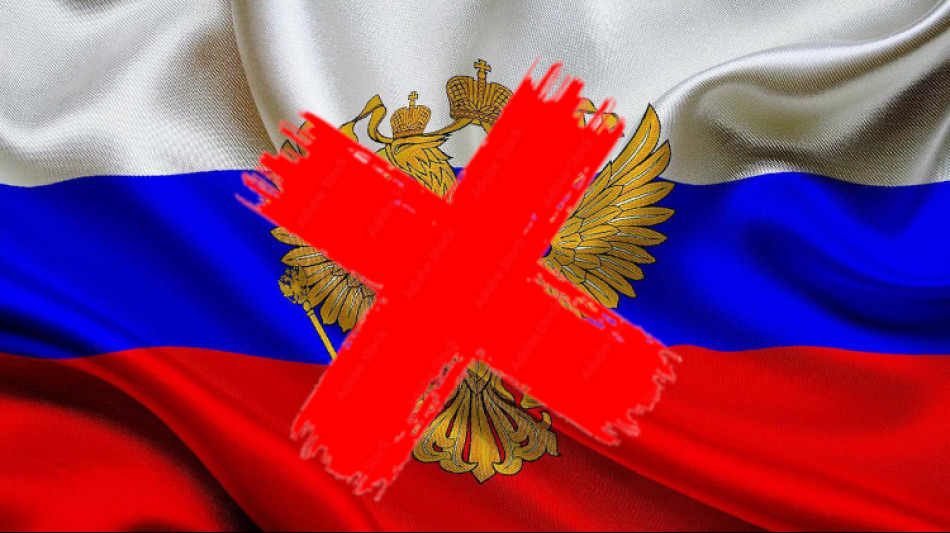-
 Webb spots strongest 'hints' yet of life on distant planet
Webb spots strongest 'hints' yet of life on distant planet
-
Arteta's Arsenal come of age with Madrid masterclass

-
 None spared in Nigeria gun, machete massacre: survivors
None spared in Nigeria gun, machete massacre: survivors
-
'No problem' if Real Madrid replace me: Ancelotti

-
 Inter dreaming of treble glory after reaching Champions League semis
Inter dreaming of treble glory after reaching Champions League semis
-
'No limits' for treble-hunting Inter, says Pavard

-
 Inter off Bayern to reach Champions League last four
Inter off Bayern to reach Champions League last four
-
Rice 'knew' Arsenal would dethrone Real Madrid

-
 US stocks fall with dollar as Powell warns on tariffs
US stocks fall with dollar as Powell warns on tariffs
-
Arsenal oust holders Real Madrid to reach Champions League semis

-
 Arsenal defeat Real Madrid to reach Champions League semis
Arsenal defeat Real Madrid to reach Champions League semis
-
AMD says US rule on chips to China could cost it $800 mn

-
 Inter hold off Bayern to reach Champions League last four
Inter hold off Bayern to reach Champions League last four
-
El Salvador rejects US senator's plea to free wrongly deported migrant

-
 Newcastle thrash Crystal Palace to go third in Premier League
Newcastle thrash Crystal Palace to go third in Premier League
-
Zuckerberg denies Meta bought rivals to conquer them

-
 Starc stars as Delhi beat Rajasthan in Super Over
Starc stars as Delhi beat Rajasthan in Super Over
-
Weinstein asks to sleep in hospital, citing prison 'mistreatment'

-
 Amorim asks McIlroy to bring Masters magic to Man Utd
Amorim asks McIlroy to bring Masters magic to Man Utd
-
Ruud keeps Barcelona Open defence on course

-
 Trump tariffs could put US Fed in a bind, Powell warns
Trump tariffs could put US Fed in a bind, Powell warns
-
CONCACAF chief rejects 64-team World Cup plan for 2030

-
 Putin praises Musk, compares him to Soviet space hero
Putin praises Musk, compares him to Soviet space hero
-
Son to miss Spurs' Europa League trip to Frankfurt

-
 US senator in El Salvador seeking release of wrongly deported migrant
US senator in El Salvador seeking release of wrongly deported migrant
-
Trump tariffs could put the US Fed in a bind, Powell warns

-
 US judge says 'probable cause' to hold Trump admin in contempt
US judge says 'probable cause' to hold Trump admin in contempt
-
India opposition slams graft charges against Gandhis

-
 Nate Bargatze to host Emmys: organizers
Nate Bargatze to host Emmys: organizers
-
US Fed Chair warns of 'tension' between employment, inflation goals

-
 Trump touts trade talks, China calls out tariff 'blackmail'
Trump touts trade talks, China calls out tariff 'blackmail'
-
US judge says 'probable cause' to hold govt in contempt over deportations

-
 US eliminates unit countering foreign disinformation
US eliminates unit countering foreign disinformation
-
Germany sees 'worrying' record dry spell in early 2025

-
 Israel says 30 percent of Gaza turned into buffer zone
Israel says 30 percent of Gaza turned into buffer zone
-
TikTok tests letting users add informative 'Footnotes'

-
 Global uncertainty will 'certainly' hit growth: World Bank president
Global uncertainty will 'certainly' hit growth: World Bank president
-
EU lists seven 'safe' countries of origin, tightening asylum rules

-
 Chelsea fans must 'trust' the process despite blip, says Maresca
Chelsea fans must 'trust' the process despite blip, says Maresca
-
Rebel rival government in Sudan 'not the answer': UK

-
 Prague zoo breeds near-extinct Brazilian mergansers
Prague zoo breeds near-extinct Brazilian mergansers
-
Macron to meet Rubio, Witkoff amid transatlantic tensions

-
 WTO chief says 'very concerned' as tariffs cut into global trade
WTO chief says 'very concerned' as tariffs cut into global trade
-
Sports bodies have 'no excuses' on trans rules after court ruling: campaigners

-
 Zverev joins Shelton in Munich ATP quarters
Zverev joins Shelton in Munich ATP quarters
-
The Trump adviser who wants to rewrite the global financial system

-
 US senator travels to El Salvador over wrongly deported migrant
US senator travels to El Salvador over wrongly deported migrant
-
UN watchdog chief says Iran 'not far' from nuclear bomb

-
 Trump says 'joke' Harvard should be stripped of funds
Trump says 'joke' Harvard should be stripped of funds
-
Macron vows punishment for French prison attackers

Next Chancellor of Germany and Trump
A new german Leader with a clear Vision?
Merz’s victory, securing approximately 28.5% of the vote for the CDU/CSU alliance, marks a return to conservative leadership following years of coalition governance under Angela Merkel and, more recently, Olaf Scholz. With the Alternative für Deutschland (AfD) gaining 20% and the SPD trailing at 16.5%, Merz faces the task of uniting a fragmented Bundestag. Preliminary estimates suggest the CDU/CSU will hold around 179 seats, necessitating a partnership with the SPD (104 seats) and possibly the Greens (73 seats) to achieve the 316-seat majority required.
The chancellor-in-waiting has wasted no time in outlining his priorities. While congratulating Trump on his inauguration on 20 January 2025 with a handwritten letter—a gesture of diplomatic courtesy—Merz has made it clear that he will not shy away from challenging the American president where their views diverge.
The Ukraine Flashpoint:
At the heart of this anticipated confrontation lies Ukraine. Merz has been an outspoken advocate for robust European support for Kyiv, a position he underscored during a visit to President Volodymyr Zelensky in May 2022. His criticism of Trump’s rhetoric, which he has described as echoing Russian narratives, reveals a stark divide. In a recent interview Merz expressed dismay at Trump’s apparent indifference to European security concerns, labelling it a “classic case of blaming the victim.” This stance contrasts sharply with Trump’s reported inclination to pursue rapprochement with Russia, a policy that has alarmed many in Europe.
Merz’s commitment to Ukraine is not merely rhetorical. He has pledged to bolster Germany’s defence spending and has floated the idea of a new European defence alliance, potentially as an alternative to NATO, should transatlantic cooperation falter under Trump’s leadership. Such proposals reflect a broader ambition to enhance Europe’s strategic autonomy—a move that could strain relations with Washington.
Balancing Confrontation with Cooperation:
Despite his readiness to challenge Trump, Merz is not advocating for a complete rupture. In an interview last November, he emphasised the importance of “deals” with the United States, particularly in trade and economic matters, that could benefit both sides. This pragmatic streak suggests that while Merz may clash with Trump over security policy, he seeks to maintain a functional relationship in other domains. Germany, as Europe’s economic powerhouse, cannot afford to alienate its largest transatlantic partner entirely.
Implications for Transatlantic Ties:
Merz’s leadership arrives at a pivotal moment. Trump’s return to the White House has rekindled debates about the reliability of American commitments to Europe, especially within NATO. By positioning Germany as a counterweight to Trump’s policies, Merz could catalyse a shift towards a more assertive European Union—one less dependent on U.S. direction. His plans to increase defence collaboration among EU nations signal a long-term vision that may outlast transatlantic spats.
Yet, this approach carries risks. A public confrontation with Trump could exacerbate divisions within NATO and embolden critics of European unity, such as the AfD, which has capitalised on anti-establishment sentiment. Merz must navigate these domestic and international pressures with care.
Conclusion:
As Friedrich Merz prepares to assume the chancellorship, his intention to confront Donald Trump over Ukraine heralds a new chapter in German foreign policy. Rooted in a commitment to European security and independence, his stance promises to test the resilience of transatlantic relations. Whether this leads to a lasting realignment or a pragmatic compromise remains to be seen, but one thing is certain: Germany’s next chancellor is poised to make his mark on the world stage.

EU: No agreement on 10-year extension for glyphosate

Ukraine: When will the world stand up to Russian terror?

Warming: Methane levels rising, is this nature's answer?

Israel has every right to destroy Hamas and Hezbollah!

What are the effects of climate change on sea flora?

Azerbaijan is in control: Armenians flee Nagorno-Karabakh

EU countries agree on watered-down car emissions proposal

Hungary-Dictator PM Orban claims EU 'deceived' Hungary

Ruble at the end: Russia's currency on the brink of collapse

Russia in Ukraine: murder, torture, looting, rape!

That's how terror Russians end up in Ukraine!



